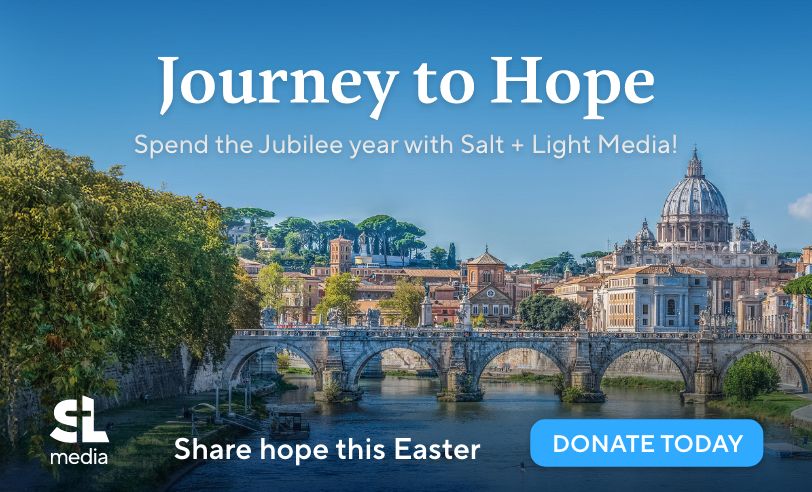A Solemn Assembly | Reflection for Ash Wednesday
Matthew Neugebauer
Tuesday, February 21, 2023

"Blow the trumpet in Zion; sanctify a fast; call a solemn assembly; gather the people. Sanctify the congregation; assemble the aged, gather the children... Between the vestibule and the altar let the priests, the ministers of the Lord, weep. Let them say, 'Spare your people, O Lord.'" (Joel 2:15, 17)What is the "foundational sin" of humanity? On Sunday, we'll hear the story of the original sin of Adam and Eve. But what is sin fundamentally about? Pope Francis puts it succinctly: "Sin is a rejection of the limits that love requires." (Let Us Dream, p. 34) When I sinfully impose my will on another person, I reject their agency and flourishing. When I cut myself off from others, I reject my own flourishing, since I reject the interdependent relationships that I need to live well. Either way, the result of sin--the essence of sin--is division: I weaken genuine relationships when I impose my own will on another, since it might provoke either rebellion or dehumanizing surrender in response. If I cut myself off from the offer of friendship with God and others, that is isolation itself. The Church, our parishes, and families are often the places we experience division the most. We have an uncanny and persistent way of harming the people and communities with whom we’re most invested and have a greater sense of belonging, and we're more sensitive to their choices and responses. This means that our temptation to want things to go “my way or the highway” is greater, as is our hurt and disappointment when they don't. 20th-century theologian Henri de Lubac described the impact of sin like this: “Injury done to one or to the other–and one is never injured without injury to the other as well–is to rend the Church, the seamless robe that Christ willed to put on that he might dwell among us.” (Catholicism, p. 79) Instead of showing the world that Christ dwells among us, it causes onlookers to ask “Where is their God?” (Joel 2:17) However, division is sin only because the foundational virtue of humanity and of creation is unity, communion: communion with God, unity with each other, and integrity within ourselves. Sin is a rejection of the requirements of charity because genuine love, an abiding "being-with," is the source that sustains an authentic unity that respects the dignity of all through the interdependence of all. The Church, your local parish, and your families are called to be places where we pursue dignifying, flourishing common life. De Lubac describes this vocation of Church and family as the summons to God’s unifying and dignifying grace: “The supernatural dignity of one who has been baptized rests…on the natural dignity of humanity….The unity of the Mystical Body of Christ, a supernatural unity, supposes a previous natural unity, the unity of the human race.” (Catholicism, p. 25) Later, he quotes the pithy formulation of Medieval Mystic Hugh of St. Victor: “Charity is the unity of the Church. Whether we call it charity or unity is all the same, because unity is charity and charity is unity.” (p. 78) At the beginning of Lent, we hear this summons to unity. We hear the Word of the Lord, through the Prophet Joel, who calls the trumpet-messengers to let loose their gathering song, to "sanctify a fast, call a solemn assembly" (Joel 2:15) of young and old, women and men, of the whole congregation together. We hear him enjoin the priests, in that space of approach to God, to give voice to the peoples' repentance, to express their sorrow for their divisive rejection of God's gift of unifying love, and to embody the people’s commitment to show the world that our loving God dwells among us. We are all called to respond, to build up our relationships, our communities and, above all and through all, return to God as the source of charity and dignity. This Lent, may we repent of our divisions, and come together for the flourishing of dignity and common life. May our priests gather us in the narthex and nave, as they welcome us into the confessional, and offer us to God as messengers of the Good News. May God, who “is gracious and merciful, slow to anger, abounding in steadfast love,” (Joel 2:13) see us and restore us.
Related Articles:
Category: General Posts, Lent and Easter
Tag: Ash Wednesday (the First Day Of Lent) (Holiday), Easter and Lent
Homily of Pope Leo XIV at the Mass for the Jubilee of Families, Children, Grandparents, and the Elderly
Sunday, June 1, 2025
 Pope Leo XIV
Pope Leo XIV
Pope Leo XIV celebrated Mass for the Jubilee of Families, Children, Grandparents, and the Elderly and referred to Pope Francis and mentioned spouses who have been beatified and canonized, like the parents of St. Therese of the Child Jesus.
Looking back on Rerum Novarum
Monday, May 26, 2025
 Matthew Neugebauer
Matthew Neugebauer
Pope Leo XIV chose his name primarily to highlight his most recent namesake Leo XIII, whose "historic encyclical Rerum Novarum addressed the social question" to the challenges of his time. What concerns does the encyclical address? How does it speak to its time? And what has been its legacy 134 years later?
Homily of Pope Leo XIV at the Mass and Installation on the Roman Cathedra
Sunday, May 25, 2025
 Pope Leo XIV
Pope Leo XIV
On May 25, 2025, Pope Leo XIV was formally installed on the cathedra of the Diocese of Rome at a Mass in St. John Lateran Basilica. In his homily, he said that "communion is built primarily 'on our knees,' through prayer and constant commitment to conversion."
St. John Lateran: The Pope’s Cathedral
Friday, May 23, 2025
 Matthew Neugebauer
Matthew Neugebauer
Did you know that the pope has his own cathedral? Pope Leo XIV is about to "take possession" of the Lateran Basilica, which you can read all about here.
Homily of Pope Leo XIV at the Inaugural Mass
Sunday, May 18, 2025
 Pope Leo XIV
Pope Leo XIV
On May 18, 2025, Pope Leo XIV inaugurated his pontificate with Holy Mass in St. Peter's Square. In his homily, he said, "I come to you as a brother, who desires to be the servant of your faith and your joy, walking with you on the path of God’s love, for he wants us all to be united in one family."
SUPPORT LABEL
$50
$100
$150
$250
OTHER AMOUNT
DONATE













